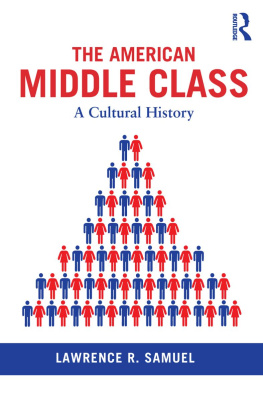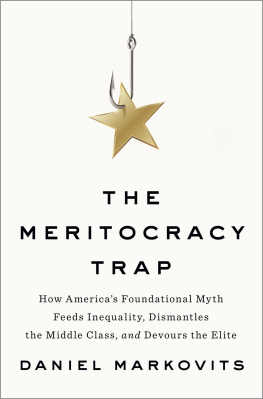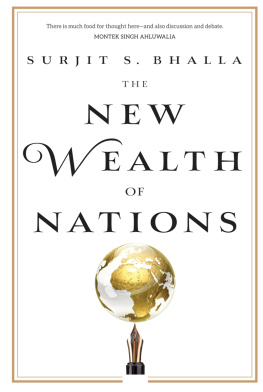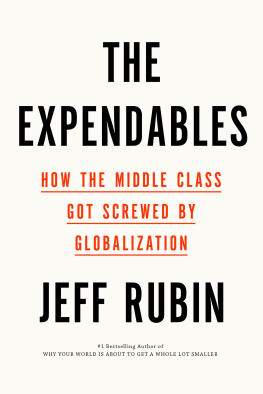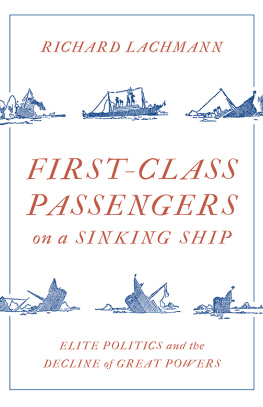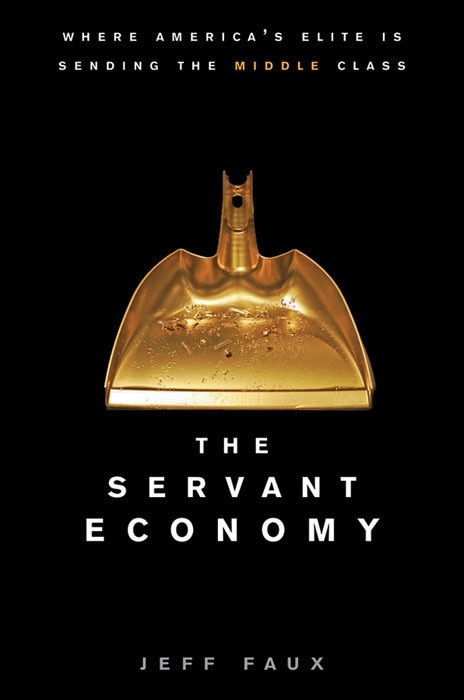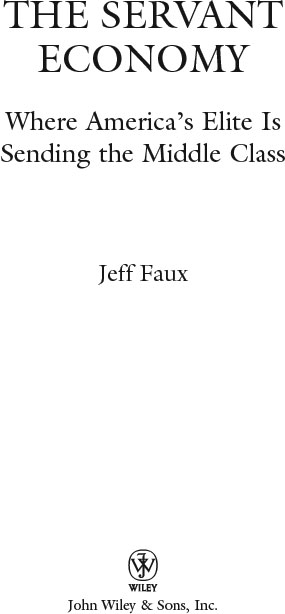Also by Jeff Faux
New Hope for the Inner City
The Star-Spangled Hustle (with A. Blaustein)
Rebuilding America (with G. Alperovitz)
Reclaiming Prosperity (with T. Schafer)
The Partys Not Over
The Global Class War
Copyright 2012 by Jeff Faux. All rights reserved
Published by John Wiley & Sons, Inc., Hoboken, New Jersey
Published simultaneously in Canada
No part of this publication may be reproduced, stored in a retrieval system, or transmitted in any form or by any means, electronic, mechanical, photocopying, recording, scanning, or otherwise, except as permitted under Section 107 or 108 of the 1976 United States Copyright Act, without either the prior written permission of the Publisher, or authorization through payment of the appropriate per-copy fee to the Copyright Clearance Center, 222 Rosewood Drive, Danvers, MA 01923, (978) 750-8400, fax (978) 646-8600, or on the web at www.copyright.com . Requests to the Publisher for permission should be addressed to the Permissions Department, John Wiley & Sons, Inc., 111 River Street, Hoboken, NJ 07030, (201) 748-6011, fax (201) 748-6008, or online at http://www.wiley.com/go/permissions .
Limit of Liability/Disclaimer of Warranty: While the publisher and the author have used their best efforts in preparing this book, they make no representations or warranties with respect to the accuracy or completeness of the contents of this book and specifically disclaim any implied warranties of merchantability or fitness for a particular purpose. No warranty may be created or extended by sales representatives or written sales materials. The advice and strategies contained herein may not be suitable for your situation. You should consult with a professional where appropriate. Neither the publisher nor the author shall be liable for any loss of profit or any other commercial damages, including but not limited to special, incidental, consequential, or other damages.
For general information about our other products and services, please contact our Customer Care Department within the United States at (800) 762-2974, outside the United States at (317) 572-3993 or fax (317) 572-4002.
Wiley also publishes its books in a variety of electronic formats and by print-on-demand. Some content that appears in standard print versions of this book may not be available in other formats. For more information about Wiley products, visit us at www.wiley.com .
Library of Congress Cataloging-in-Publication Data:
Faux, Geoffrey P.
The servant economy: where Americas elite is sending the middle class/Jeff Faux.
pages cm
Includes bibliographical references and index.
ISBN 978-0-470-18239-0 (cloth); ISBN 978-1-118-22011-5 (ebk);
ISBN 978-1-118-23386-3 (ebk); ISBN 978-1-118-25848-4 (ebk)
1. United StatesEconomic policy2009 2. United StatesEconomic conditions2009 3. Middle classUnited StatesEconomic conditions. I. Title.
HC106.84.F38 2012
330.973dc23
2012013719
To my wife, Marge, helpmate and soul mate
Part I
The Pursuit of Folly
The future ain't what it used to be.
Yogi Berra
The Politics of Hope
Historians who look back to our time will surely conclude that our problem was not that we didnt know where we were headed, it was that we didnt act on what we knew.
Even before the financial crash of 20082009 and the Great Recession that followed, there was ample warning. Whether you were a journalist who produced the news, a politician who made the news, or a citizen who read or watched the news, it was hard not be aware that for the past thirty years, the following had been happening:
- Most Americans had experienced stagnant real incomes, shrinking financial security, and fraying social safety nets.
- The nation had been buying more from the rest of the world than it had been selling and was borrowing to finance the difference.
- Despite the erosion of U.S. economic power, the governing classDemocrats and Republicans alikeinsisted on maintaining its global hegemony, whatever the cost.
Sweeping historical analogies between the present-day United States and the decline and fall of earlier empires, once the subject of rarified university seminars, had been seeping into public consciousness for the previous three decades. Yale historian Paul Kennedys best-selling book, The Rise and Fall of the Great Powers , revived grand theories of the natural life cycles of empires that had been proposed earlier in the twentieth century by German philosopher Oswald Spengler and British historian Arnold Toynbee. Looking at the erosion of U.S. leadership in technology and trade competitiveness, Kennedy suggested that the United States might be headed for the same fate as past superpowers that had collapsed because their political ambitions had expanded beyond their economic bases. His book spawned an academic cottage industry that fondled the historical analogies: Were we Rome in the fourth century? Spain in the sixteenth century? England at the beginning of the twentieth century?
Kennedys book also spawned an even larger industry of politicians, pundits, and academics who flatly rejected the notion that anyone could hear the bells of history tolling the end of Americas time in the sun. Indeed, the neoconservative academic Francis Fukuyama responded that the bell was tolling for history itself: the United States had already achieved the best possible society in an imperfect world. Fukuyama later backed off, but his thesis remains the operating assumption of the U.S. governing class.
Still, throughout the giddy years of the successive stock market and real estate booms, Kennedys analysis touched an undercurrent of economic anxiety among traditionally optimistic middle-class Americans, who were increasingly aware that more of their shoes, underwear, televisions, automobiles, and computers were being made in China, Korea, and Mexico. A stream of books, news articles, and websites pumped out the accumulating statistics of working Americans financial stress. Plots about lousy jobs, layoffs, and maxed-out credit cards popped up in TV sitcoms, Hollywood movies, and popular music. In his 1992 campaign for president Bill Clinton observed in television advertisements that Americans were working harder for less. Fifteen years later, at the peak of the financial bubble, the numbers showed that they still were.

The United States remains rich in industrious and adaptable people, stable political institutions, a widespread commitment to material progress, and more than its share of the planets natural assets, but it is no longer rich enough to continue to finance Americas three principal national dreams:
The dream of the business elite for subsidized, unregulated capitalism
The dream of the political elite for global hegemony
The dream of the people for a steadily rising standard of living
We can certainly continue to have one out of three, and perhaps even two out of three. But, three out of three? No.
Nevertheless, the end-of-empire story has limited appeal for the U.S. governing class: the politicians, the media pundits, and the policy managers who move through revolving doors to and from investment banks, global corporations, universities, think tanks, and high-level government jobs. Of course they admitted that the country had problems; indeed, it was their job to solve them. But the suggestion that the United States might no longer be able to have it all was not very useful for ambitious leaders whose careers depended on their ability to project self-confidence. Nor was it useful for their wealthy patrons who valued the prices of the futures in their global portfolios more than the future of their country.




